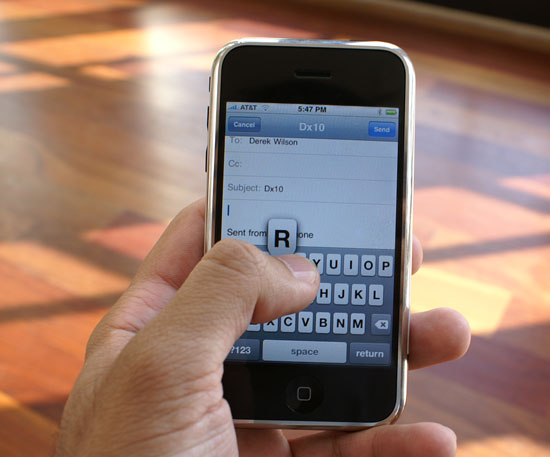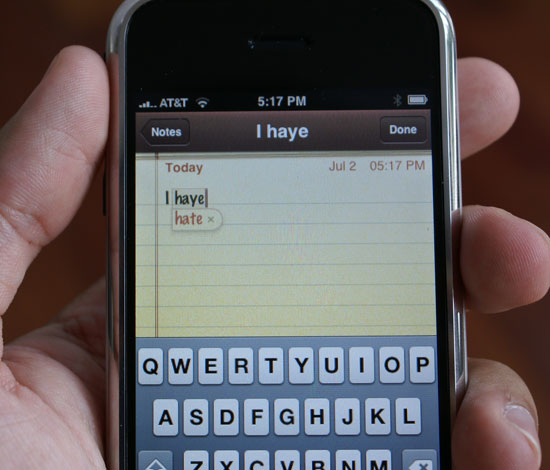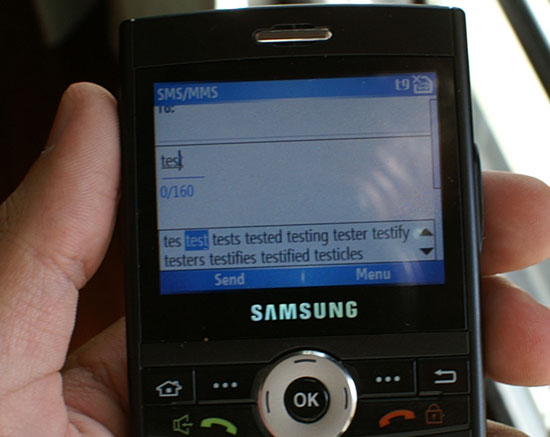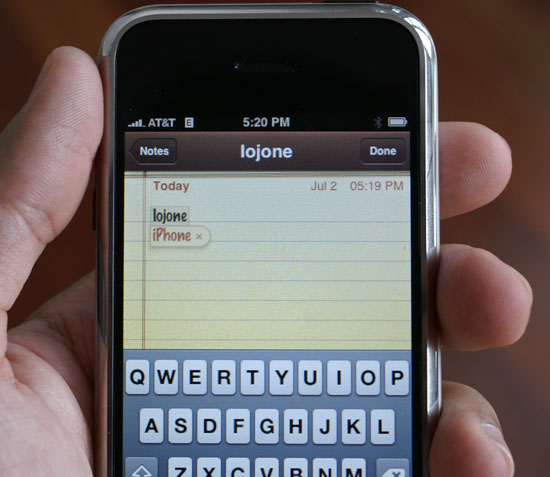Apple's iPhone: The Future is Here
by Anand Lal Shimpi on July 2, 2007 6:13 PM EST- Posted in
- Smartphones
- Mobile
As predictable as what happened next may be, its truth is undeniable: I actually got better with the iPhone's keyboard. I wasn't as fast as I was on my Blackberry or even the Blackjack, but I was getting there and typing on the phone no longer made me want to kill myself with a SIM card.
There are really two tricks to getting reasonably fast with the keyboard, and Apple is very forthcoming with both:
1) Start with your index finger alone (give your thumbs the week off), and
2) Trust the auto correction
Using the index finger is important for one main reason: it's smaller than your thumb. Just as the cramped keyboard is an issue on the Blackjack and Curve, it's an issue on the iPhone. Since there are no distinct divisions between keys, it's very easy to cross boundaries and select a letter you didn't intend to. Whenever you tap a key, the key itself will get bigger to show you what you've just selected, hopefully exposing itself from beneath your finger. If you happen to select the wrong key, your initial instinct will be to delete and try again but that's not necessarily the best reaction with the iPhone as you'll soon see.

The iPhone will make you feel like you've got the fattest thumbs ever
With my index finger, I'm accurate and fast in typing on the iPhone. On my best days you'd swear a room full of monkeys were churning out a copy of Macbeth, that being said, I'm in desperate need of mastering two thumbed typing. Not only does typing long emails with a single index finger grow tiring, two thumbs are necessary to even remain competitive with typing speeds on regular qwerty keyboard devices.
I'm guessing the trick to mastering thumb typing is deliberate placement of your thumbs over the keys you wish to strike. Although your thumb is bigger than your index finger, the part of your thumb that actually triggers the keystroke isn't that much larger. The main issues seem to be that the thumb's contact patch is located in a different area, and the thumb covers up more of the keyboard, making it more difficult to 1) orient and 2) trust yourself, when typing. As you can probably guess, I'm still struggling with thumbs, but it looks like there's still room to grow in typing efficiency on the iPhone.
The iPhone does its best to replace tactile feedback with aural response; you get a rewarding typewriter keystroke sound every time you hit a key on the keyboard (you can disable this if you hate it). The sound is rewarding in the sense that once you actually get fast at typing, it sounds like your pounding out your fifth novel on your iPhone, and if you thrive on feelings of accomplishment like yours truly, it'll help you get better. It's like a personal trainer cheering you on as you work out, the sounds keep coming as long as you keep hitting keys, they don't care if you hit the wrong ones or not, and that's where the second trick comes in.
The early previews and reviews of the iPhone praised its autocorrecting capabilities, which I truly didn't understand because predictive text input has been around for ages. From a distance, that's all the iPhone appeared to have, a slightly cleaner interface to T9. On the second day of using the iPhone, I finally understood what all the fuss was about.

When you're entering text, the iPhone compares what you're typing to its built in dictionary and suggest words that it thinks you are trying to type. For example, if you are typing the word incredible the iPhone will figure it out once you've typed incredibl and suggest the full word. Hitting space at this point will accept the dictionary's suggestion, saving you a keystroke.

T9 in action
The first difference between the iPhone and some T9 based systems (e.g. the Blackjack) is that the iPhone provides a single suggestion while you're typing. If you enable T9 on the Blackjack, you lose some of your screen to a two-line suggestion of possible words you could be trying to type, which changes dynamically as you type away. The end result is a distracting element on the screen that adds marginal functionality on a device with a full qwerty keyboard vs. the iPhone method that remains nonintrusive.

If you don't like the iPhone's suggestion, simply tap the suggested word and it'll disappear. Note that just like T9 based systems, the iPhone's dictionary will grow based on your typing habits; proper nouns and other words will eventually start appearing as suggestions as you type them more frequently.
Both the T9 and iPhone approaches take some getting used to if you are a qwerty Blackberry user who isn't used to such aids, but the iPhone system has a gentler learning curve thanks to its simplicity.
In addition to looking at the word you're typing, iPhone also looks at the keys you're hitting and the proximity of those keys to other keys that you may have actually wanted to hit instead. For example, the word iPhone comes preloaded into the dictionary, the device doesn't have to learn it. But if, while typing furiously with your index finger, you lose your bearings and type iogonr instead (the o key is right next to the p key, the g key is right next to h, and and r is right next to e), the iPhone will mathematically determine that although iogonr could be a word, it's also possible that you just fouled up your finger placement and meant to type iPhone. The software will suggest iPhone as a correction and all you have to do is hit space to accept it.
When Apple recommends that you trust the intelligence of the device, it's this analysis of finger placement that you need to trust. When typing, you know what keys you meant to hit, Apple's iPhone tries its best to figure that out as well (it doesn't like to be yelled at, so it tries really hard).










85 Comments
View All Comments
ninjit - Monday, July 2, 2007 - link
Argh, looks like everyone bogged down the image server.I just happened to hit refresh right when the article went live, and was happily reading it for the first 10 pages, but now none of the images are load for page 10 onwards.
grrrr
goinginstyle - Monday, July 2, 2007 - link
I just finished it, took a minute for the last two images to show up. Great article by the way and now I know what to get the wife for her birthday next week.ButterFlyEffect78 - Monday, July 2, 2007 - link
I love my iPhone. I love texting all my friends and showing them my poop. Its great. Thank you Apple.rADo2 - Thursday, July 5, 2007 - link
This phone is horrible.My needs e.g. are much higher than those offered by $500-600 dumbphone with Apple logo on it.. There are dumbphones on the market for $0 - 29.95, that can do more than iPhone. Take any Nokia phone (and they have MMS, voice dial, and record video)... And there are also many $199 smarpthones with Windows Mobile and/or Symbian UIQ that can install 10,000+ apps, many of them being freeware.
No need to lock yourself in Apple overpriced monopoly with little functionality.
If your needs are simple, and you value Apple logo above all, iPhone may still appeal to you. Why not. But "dumbphones" with many lacking features sold for $500-600 with 2 year contract most certainly do NOT appeal to smart and advanced users.
In fact, biggest disadvantage of iPhone is not even missing features like voice dial, MMS, HW keyboard and/or GPS, but completely missing SDK. Developing SDK and giving it for free to developers is a major expense, and even companies like Nokia or SonyEricsson, which are on the market for "centuries", had problems with it. Microsoft has excellent SDK for Windows Mobile.
Apple has no development platform / SDK. They try to hide this huge shortcomming by saying "Safari is your SDK". Hehe. They can fool "sheeps" that JavaScripts widgets running under Safari are real apps, but not tech people and business people. You cannot code (e.g.) GPS navigation handling 1GB maps, or advanced IM client under JavaScript/HTML/CSS.
Thus their phone is basically a "dumbphone", not a smartphone, as installing native apps is a primary thing that distinguishes dumbphones for smart ones.
Why devote 50+ pages review to something dumb? "Sponzored" by Apple?
michael2k - Thursday, July 5, 2007 - link
You have to use it to understand, I think.You talk about features, but as the review mentions explicitly, it's the interface, a feature in it's own right, that sells the iPhone. Does any 0-$29.95 have a touchscreen as nice as the iPhones? You kind of have to compare it to other touch screen phones to "get it".
Cygni - Thursday, July 5, 2007 - link
Exactly. The strength of the iPhone is that it DOESNT have hundreds of features tacked onto it, all done, but none done well. The iPhone does what 95% of the phone buying public wants to do with a phone, and does those functions better than any other phone produced today. That is it strength. That is why its bound to change the way cellphones are made and sold.The reason smartphones havent taken off for a vast majority of the public was that they were simply too dificult to use, big, ugly, and counterintuitive. They were systems of endless ugly windows, with terrible fonts, on grainy screens. They were huge fields of buttons with multiple functions for each key. They tried to do everything. Thats NOT what the majority of phone buyers want in a phone. They want something functional, useable, and enjoyable.
To put it simply, the iPhone does what nearly everyone wants to do on a phone better than anyone else. Anyone who touches it and slides that unlock bar over for the first time has fallen in love. I personally wont be purchasing one for another year, while i wait for my contract with Sprint to expire, and i hope that the second gen has arrived by that time.
How can you justify spending $600 on a phone that doesnt do everything? The average american spends an ABSURD amount of time with their phone, doing standard phone things. Calls, Alarms, Texts. If i can make those hours of my day far more enjoyable for barely the cost of 2 car payments? I would say thats worth it.
rADo2 - Thursday, July 5, 2007 - link
Well, iPhone SW is poorly done IMHO, e.g. not being able to search through contacts by typing is major drawback. I cannot imagine having to scroll through my 1000 contacts...There are e.g. great Samsung and/or Nokia phones sold for $0-50 (with contract) that are better "dumbphones" than iPhone, have 3G, MMS, can record video, play music on stereo BT headset, etc.
iPhone does lack some very basic features, and I consider it to be hype only. Apple has brilliant advertising and "wow" factor, but this will wear-off within next few weeks.
dborod - Thursday, July 5, 2007 - link
There is an onscreen alphabet that lets you easily jump to contacts starting with that letter so you don't have to scroll all the way.rADo2 - Thursday, July 5, 2007 - link
Yes, but that is only single letter. WM5/6 devices can do initial search (multiple letters) or even sequantial search, see e.g. http://www.sbsh.net/products/contactbreeze/">http://www.sbsh.net/products/contactbreeze/If you have like 100 contacts beginning with "K", it will be very hard to use iPhone to find and dial the right contact. And voice dial will not hell either.
michael2k - Sunday, July 8, 2007 - link
You make it sound like Apple won't be adding search.To my knowledge Apple has updated/upgraded via firmware every single one of it's iPods.
Why do you think the software on an iPhone is "stuck" the way it is now? I imagine within a month of use, with feedback and real world experience, Apple will release an updated browser, mail client, media client, and text interface.
Then what about your complaints?
The iPhone is, for Apple, a miniature computer, and as such can be updated with fixes and software.